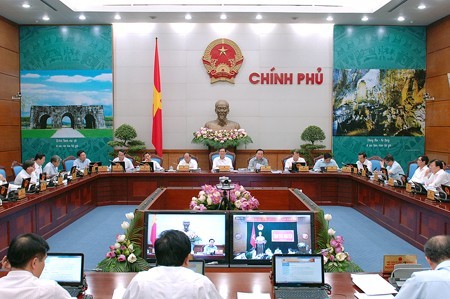(VOVworld) – Vietnam’s economy has recorded several achievements in 2014 including higher GDP growth than anticipated, the lowest inflation rate in many years, and the adoption of policies to improve the country’s investment and production environment. The results prove the government’s effective management and effort of the public and the business community to overcome difficulties.

The government holds monthly meeting on socio-economic situation (photo: VGP) |
In 2014 Vietnam has surpassed its socio-economic targets. Vietnam has basically resolved post-crisis issues and begun to rebound. Putting much effort into reforming administrative procedures and improving the investment, trade, and production environment, the government has stabilized the macro-economy while obtaining a reasonable growth rate.
The government’s appropriate, prompt policies and effective macro-economic management.
For the first time in 3 years Vietnam obtained a GDP growth of 5.98%, higher than the target of 5.8% set by the National Assembly for 2014. Inflation and interest rates have eased, helping individuals and businesses access credit. Exports have maintained a high growth rate, earning revenues of more than 150 billion USD, 13.6% above the previous year. Newly registered FDI projects have increased 24.5% and investment capital grew 9.6%, foreign investors’ growing trust in Vietnam’s business environment. Tomoyuki Kimura, ADB’s Country Director for Vietnam, said: "Vietnam successfully managed the macro-economy this year. It's the 3rd consecutive year of macro-economic stability. In terms of containing inflation, stabilizing foreign exchange and achieving reasonable level economic growth, I think the government did a good job. But by going forwards to address the root causes of recurring macro-economic instability, the government has to accelerate the implementation of restructural reforms including SOEs, public investment, and banking sector reform."
Vietnam successfully managed its foreign exchange market in 2014. The exchange rate between the USD and the VND fluctuated around 1% and the level of dollarization was 20%. These factors have supported the implementation of financial and monetary policies. La Ngoc Thoang, a NA deputy from Cao Bang province, said: “The government has applied prudent financial policies to match Vietnam’s economic situation, curb inflation, and fuel growth. The exchange rate has been adjusted periodically. The state foreign currency reserve has increased. Stable exchange rate has supported production and won the public’s trust in the VND, one of the factors attracting foreign investment to Vietnam.”
Great effort to improve investment, production, and trade environment
Administrative reform to improve competitiveness has been a consistent policy in 2014. The government has called for revision or repeal of inappropriate regulations, built a more favorable trade environment, and laid a firm legal foundation for the business community. Government leaders, ministries, and sectors organized scores of dialogues with businesspeople, and Vietnamese and foreign investors on administrative reform related to taxation, customs, land or starting a business. Chairman of the Vietnam Chamber of Commerce and Industry Vu Tien Loc said: “The government has adopted the standards of ASEAN-6 countries in administrative reform. The government has directed the tax, customs, electricity, and business creation and dissolution agencies to reform to meet ASEAN 6 administrative standards. For example, the average time needed to pay taxes and social insurance must be reduced from 872 hours a year to 171 hours. After dialogues with businesses, several administrative procedures were simplified.”
Despite difficulties Vietnam made remarkable economic achievements in 2014 which are providing momentum to reach its 2015 development targets.